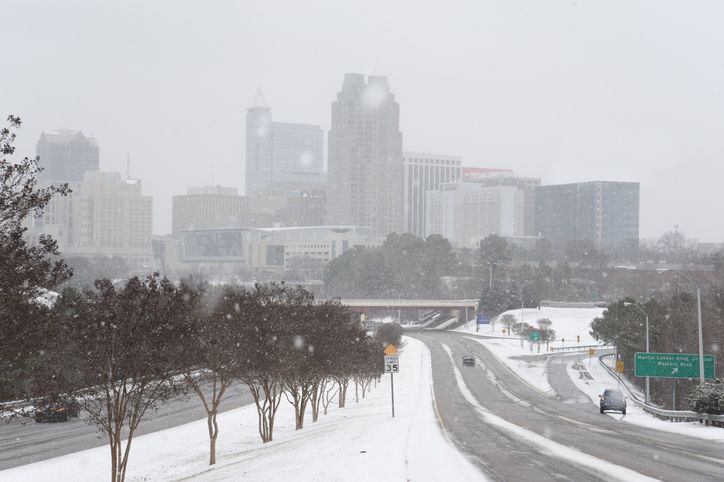Although North Carolina receives little to no snowfall most winters, residents still have inclement weather to manage—no matter if they live in one of the many beautiful cities or picturesque rural areas of the state. Colder temperatures plus increased rainfall, ice, and wind can all challenge even the safest and most experienced drivers. Add mountains and densely wooded areas to the mix, and you’ve got a recipe for some potentially white-knuckled driving conditions.
Fall is the perfect time to start prepping yourself and your vehicle for the months ahead. A little added attention now can be what prevents you from getting into a car accident later.
As experienced personal injury lawyers, we know just how difficult car accident injuries can be to manage—and how some can be avoided. The following tips can help Raleigh, North Carolina drivers avoid issues while on the road this winter.
Before hitting the road
Benjamin Franklin once said, “An ounce of prevention can be worth a pound of cure.” That’s true for winter driving: A little extra precautions taken now, before a crisis occurs, can potentially help you avoid issues later. A few tips to keep in mind, before you get behind the wheel:
- Keep an eye on the sky: Watching the weather during the winter months is key to keeping your trip safe and successful. And, if you see that there’s a chance for nasty weather on the day you’re planning to take a trip, consider postponing your travels.
- Give your car a check-up: Making sure you’re vehicle is road-worthy and all systems are running smoothly before winter weather hits. Now is the time to make an appointment with your local mechanic. Good things to have him or her check include:
- Battery, oil, and antifreeze levels
- Tire pressure and tread
- Heat and defrost systems
- Brakes and brake fluid
- Windshield wiper fluid (ask if a wintertime mix is right for your car)
- Headlights, taillights, and brake lights
- Pack a winter emergency kit: If you’re planning a longer road trip, it can be helpful to pack a winter emergency kit to keep in your trunk. You may end up not needing it. But, if something goes wrong, you’ll be glad to have the extra supplies. Consider packing the following in your kit:
- Blankets and warm clothes
- Jumper cables
- A small shovel; as well as: kitty litter, snowmelt, or sand (in case you get stuck)
- Good boots
- Water
- Basic first aid kit
- Phone charger
- Flashlight
- Don’t drive distracted or while drinking: Abstain from alcohol when you’re driving and be wary of any medication that may cause drowsiness or impair your judgment or reflexes. Additionally, don’t text and drive. Instead, keep your eyes on the road and your surroundings.
While on your trip
Black ice and wet roads wreak havoc on drivers. Take care and note your surroundings; adhere to safe speed limits, and allow for adequate stopping distance when approaching traffic or road stops ahead.
Bottom line: Slow down and take your time. And, if you don’t have to be traveling when you know the weather could pose a problem, try to avoid it.)
If an accident does occur
If something should happen on the road this winter, first things’ first: Check yourself and family and make sure you’re OK.
Next step: Don’t panic! We’re here to help. Accidents are scary and stressful, but our experienced lawyers are well versed in how best to help you and your families get the compensation you need. We’ll take care of any legal services you may need, so you can focus on your recovery and getting back on track quickly.
Give us a call today at (888) 253-4071 to learn more about how we can help you build or manage your specific personal injury or auto accident case. We look forward to helping find a successful resolution.
Note: This blog is intended to be informational only and shall not be construed as legal advice.


